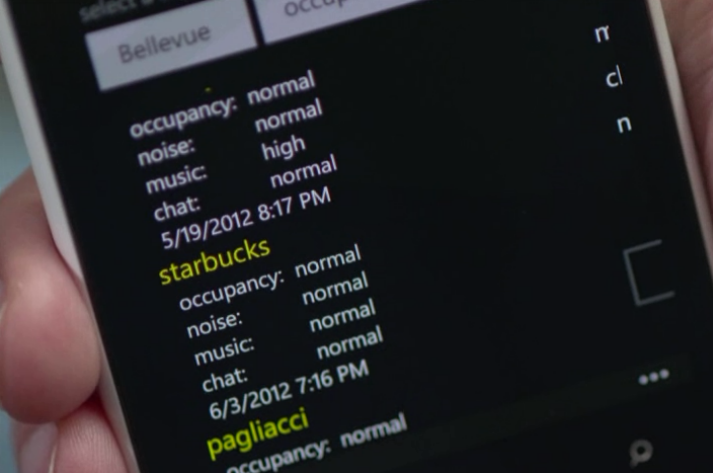Bing Now Turns to Live Crowdsourcing for Advanced Search
March 13, 2013
Bing Now, a new research project demonstrated at Microsoft’s headquarters last week, could give Web searchers a way to gauge the ongoing atmosphere of a bar or restaurant before they decide to visit or make a reservation. Researchers are looking to smartphone owners who are already at the location to provide updated information when checking in. The crowdsourcing tool measures sound with the smartphone’s microphone.
“Every time a user checks in to a business, he actually explicitly tells us where he is going, and we actually know the phone is in the user’s hands,” explains Dimitrios Lymberopoulos, a researcher with the sensing and energy group of Microsoft Research.
“When a person checks in, as a Foursquare user would, the phone could collect 6-to-10-second audio samples, process them on the device, and send off the extracted data,” notes MIT Technology Review. “From this information, software models developed by Microsoft’s researchers could tease out the size of the crowd, the level of chatter, and the music volume and classify them as ‘low,’ ‘normal,’ or ‘high.'”
Microsoft Research has posted a 3-minute video demo that illustrates the concept in action on a Windows mobile device. The video explains how users can access real-time business information via crowdsourced check-ins — including the actual audio samples — and details how the metadata can further be used to create filters for a more refined search.
For example, if you are looking for a crowded happy hour at a bar, you would likely conduct your search with filters set for high volume regarding music and chatter. The application would then provide a list of locations within your area that matched that criteria over the past 30 minutes. If you are a family looking for a relaxing restaurant experience, you would reset your filters accordingly, with options such as “low noise” and “normal occupancy.”
According to Lymberopoulos, the classification algorithms that separate the categories (for example: chatter and background music) had an 80 percent accuracy rate when tested at 150 businesses in the Seattle area.
Bing Now is currently in the research stage. “But as companies like Google, Yelp, and many startups all try to position themselves as the go-to way to find local businesses, it’s not hard to imagine how the idea could help Microsoft promote its Bing search engine and become a bigger presence on mobile devices,” suggests the article.
Technology Review points out that some researchers are imagining an entirely new kind of real-time search engine, one that leverages data from networks of sensors, including those found in our mobile devices.


No Comments Yet
You can be the first to comment!
Leave a comment
You must be logged in to post a comment.